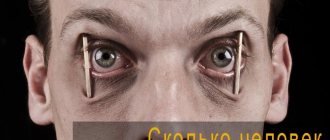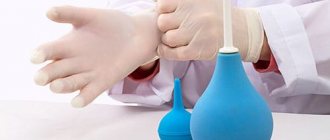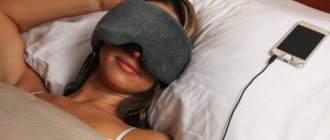Spoiler alert: neuroscientists don’t know exactly why we sleep, and they’re constantly changing their minds about how to sleep properly. If I had only 30 seconds, I would tell you that:
- No known animal can regularly sleep less than 2 hours (even a student).
- From lack of sleep they get fat, get sick and become dumb.
- Sleep learning doesn't work.
- Try a sleep mask.
- It is more pleasant to fall asleep in a warm place.
- Physical activity interferes with falling asleep if you exercise less than 2 hours before bedtime.
- Alcohol interferes with deep sleep.
- Waking up in the dark is bad; the brain needs bright light to understand that it is already morning.
- Lucid dreaming is recognized in scientific circles.
- We do strange, socially unacceptable things in our sleep because... our prefrontal cortex is suppressed (and not because we are maniacs at heart).
- Perhaps age-related memory problems can be solved by sending weak electrical impulses to the brain during sleep.
Below the cut is a summary of 7 minutes of reading an hour-long speech about sleep by Asya Kazantseva “Why you need to sleep and how to do it correctly.” Another point to add to the collection of useful materials about sleep is Sleep Hackers. Skip to video
How animals sleep
Scientists assume that all mammals and all vertebrates sleep.
Invertebrates do not sleep in the traditional sense, but they also have activity cycles. Sleeping dramatically increases the likelihood of being eaten, so getting rid of sleep would be a strong evolutionary advantage. But that didn't happen.
There is variability in sleep duration depending on where you are on the food chain. It is normal for a lion, who has no natural enemies, to catch prey and sleep for 18 hours, quietly digesting dinner. A horse or other large ungulate has to sleep 2 hours a day, with most of the time on its feet. They sleep lying down for 15 minutes only because of the REM sleep phase, when muscle activity is paralyzed. This is done by ungulates surrounded by awake relatives.
For a long time, scientists thought that sharks do not sleep, because... Due to physiology, they need to move and create a flow of water so that their gills filter oxygen. Recently, divers have been finding sea caves with underwater currents, where sharks lie at the bottom. Streams of water wash their gills. No one took an encephalogram from the shark, but it seems that sharks sleep like that. Some researchers believe that the spinal cord is responsible for swimming in sharks, so they can both swim and sleep with their brain ( author’s addition
).
Dolphins and whales generally sleep with half their brains to avoid drowning.
Classic study of sleep deprivation in mice
Link to the textbook where the illustration is from.
Mice live on a rotating platform, under the same conditions, and electrodes are implanted into their brains. One is allowed to sleep, the other is not. The one who sleeps lives on the platform is not very fun, but for a long time. The one who does not sleep begins to eat a lot, loses weight and dies in a month.
It is not always clear why the mouse died. She has brain damage, but not enough to die from it. Her immune system is suppressed, but the laboratory can create a sterile environment without bacteria.
Such experiments have not been carried out on humans.
Consequences of lack of sleep in people
According to the American Sleep Association, 1.5 thousand people die from lack of sleep on the roads
. In total, there are about 100,000 road accidents a year due to lack of sleep, in which 70,000 people are injured.
Lack of sleep greatly reduces reaction speed. A person can still drive a car, but will not be able to react correctly or in a timely manner to an emergency situation.
People get fat from lack of sleep
. Due to lack of sleep, a person's sensitivity to insulin decreases. This hormone helps absorb glucose from the blood. If there is insulin, but the cells do not respond to it, they do not absorb glucose, send a signal that they are “hungry” and the person overeats.
This also puts you at risk for type 2 diabetes
, when the cells do not respond correctly to insulin, send a signal that more insulin is needed, the pancreas begins to produce more insulin, the pancreas becomes exhausted, insulin production stops and the person has to take insulin injections.
Melatonin
A hormone that is produced when we sleep in the dark.
Melatonin is responsible for the restoration of the body and the proper functioning of the immune system. The immune system fights more than just bacteria and viruses. It also destroys cancer cells in the body. Normally, almost every body contains a small number of cancer cells, which the immune system will soon kill. Cancer begins if the immune system for some reason did not notice the cancer cells in time and they grew greatly. The likelihood of cancer increases
, if a person is awake or sleeps in the light.
A growth hormone
Sleep is important for children due to the production of growth hormone.
But in adults, growth hormone is responsible for restoration and minor “repairs” - wound healing, for example. Experiments were conducted on animals, due to sleep deprivation they heal wounds more slowly
.
If you get vaccinated, you should start to develop antibodies. When a group of volunteers, in the name of science, did not get enough sleep after vaccination, then after 3 weeks tests showed that the vaccination did not help them - the body could not produce enough antibodies. This part of the volunteers did not develop immunity against diseases.
If you don't sleep, problems with immunity, intelligence and metabolism begin. But this does not answer the question of why sleep and what is the main function of sleep.
What else affects sleep?
Some substances cause drowsiness: antihistamines, melatonin, some psychotropic drugs, marijuana, alcohol. While some of them induce sleep, they can block REM sleep and lead to disrupted sleep later.
For example, alcohol acts as a sedative and can help you fall asleep, but after a while it has a strong stimulant effect, and you may suddenly wake up in the middle of the night.
Stimulants that interfere with sleep: caffeine and theine (coffee and tea, respectively), amphetamines and other drugs that stimulate the central nervous system, nicotine, energy drinks, etc. All of them have many side effects and can be addictive.
Some foods that contain the amino acid tryptophan (bananas, dates, peanut butter, tuna, shrimp, turkey, yogurt, milk) and foods high in carbohydrates that increase serotonin (breads, cereals, sugars) improve sleep.
But foods containing tyramine (bacon, ham, eggplant, raspberries, avocados, nuts, soy sauce, red wine) can have the opposite effect, making it difficult to fall asleep.
Data processing
Because We sleep with the “brain”, it can be assumed that we sleep for
the brain.
The modern neurobiological mainstream thinks that sleep is needed for information processing and the transition of information from short-term memory to long-term memory.
There was a 2009 study where rats were taught to go through a maze, and when they fell asleep, they scanned the rat's brain and saw that the brain consistently activated the same areas as when going through the maze.
Here is a large overview of research on sleep.
Read also
- Is sleeping on the floor beneficial or not?
- How to fall asleep quickly and have a good night's sleep? Effective tips for improving sleep
- Why do you want to sleep after eating? The causes of fatigue and lethargy may not be related to food intake
- Why is it better to sleep under a heavy blanket? How it works? How to choose it correctly?
Photo: pexels.com /Polina Kovaleva, cottonbro, Andrea Piacquadio;
unsplash.com/Andrew Seaman, Mert Kahveci
Stages of sleep
It is more difficult for older people (60+) to enter the stage of slow wave sleep. Some researchers think that age-related memory problems may be due to this.
Lisa Marshall tried using transcranial electrical stimulation to “help” the brain remember information. [Link 1], [Link 2].
Participants in the experiment learned pairs of words, were tested in the evening, and then they went to bed with electrodes on their heads. Half slept with the electrodes on, half with them off. The subjects did not feel anything; waves of 0.75 Hz were invisible to perception. In the morning, participants took the test again. Everyone showed better results than in the evening; sleep helps you remember. But those who did not receive stimulation recalled two more pairs of words, and those who did receive it remembered five more.
Until now, Lisa Marshall works only with older people.
Slow-wave sleep - we sleep deeply, we do not dream, our temperature drops, our blood pressure drops, our heart rate slows down, our metabolism slows down. At this stage, we can talk in our sleep and make sleepwalking movements.
Rapid-wave sleep, also known as REM/REM sleep, has an encephalogram that is almost no different from the waking state. We have dreams. During this stage, the action of the prefrontal cortex, which is responsible for willpower, cognitive control, and the idea of \u200b\u200bdecent, is suppressed. Because of this, we often commit socially unacceptable actions in our dreams.
During this stage of sleep, movement of the skeletal muscles, muscles of the arms and legs is suppressed. Sleep paralysis is associated with this. Many myths have arisen around this phenomenon.
The stage of slow-wave sleep, apparently, is more important for the body; it is longer at the beginning of sleep, and fast-wave sleep is very short at first. For an adult body, fast-wave sleep is not so important. There are antidepressants that have a side effect - a strong reduction in the stage of rapid-wave sleep. People have been taking them for years and feel fine.
It is easier to wake up during the transition from slow-wave sleep to fast sleep and quite easy at the end of REM sleep.
Alarm clocks
There are alarm clocks based on sleep stages, but they are either inconvenient or unreliable.
If this is a sensor on a mattress, then a person may also be motionless during slow-wave sleep - accuracy is lost. The most reliable option is an encephalogram, but not everyone likes to sleep in sensors.
There are bracelets that measure your pulse, which is a little more reliable than just a motion sensor. You can try different alarm clocks and find the one that suits you.
Summary
So the sleep mechanism is a factory. Together, the work of three departments - the “slow and fast sleep department”, the “biori department” - turns our sleep into a real enterprise in which all the others depend on the work of one department. The first section is responsible for ensuring that at night we go through two phases of sleep - slow and fast. The second adjusts the body to the time of day: it reminds you when to fall asleep and when to wake up. The third section includes the inhibition mechanisms of the central nervous system when we are tired, and, conversely, activates the nervous system when we are rested. Or when you’ve experienced stress—that’s why it’s so hard to sleep after a nervous day.
Do owls and larks exist?
Yes, the scientific community recognizes them.
This is primarily based on surveys where people fill out their desired bedtime, wake-up time, and productivity time. Plus, physiological experiments were carried out. There are daily temperature cycles. A person's body temperature is lowest at 4-6 o'clock in the morning; in larks this minimum occurs earlier, and in owls later. After reaching the temperature minimum, the body needs a couple more hours of sleep, and a lark can get up at 6 and feel good, but an owl cannot
A person changes preferences throughout his life.
Geography
If you live in an area where dawn comes early and a person gets tired during the day, then the owl turns into a stable lark. Although a biological lark in such a situation would go to bed and get up even earlier.
The closer to the equator, the more larks there are. Probably because it gets dark there early and it is impossible to work during the day due to the heat.
Age
Small children get up early.
During adolescence, the shift begins; by age 20, people typically reach their “owl maximum,” and for the majority of their lives, people are more inclined to adopt an owl lifestyle.
After 50 years, many return to an earlier awakening.
Larks study better at school and university, because... Lack of sleep reduces owls' intellectual capabilities, motivation, attentiveness, and willpower.
Owls have a slight advantage in IQ, which increases with age. Perhaps the only thing here is that when a person is an owl, it is more important for him to become smart in order to find a job that will allow him to build a life schedule to suit his needs.
Genetic biological clock
The hypothalamus contains the suprachiasmatic nucleus, which controls circadian rhythms. These rhythms roughly fit into 24 hours.
It seems that owls and larks appear because the body clock is fast or slow. When 24 hours have passed in the world, the body thinks that 23 or 25 have passed.
There are mutations in genes that shift the desire to sleep, for example, from 14 hours after waking up to 15 hours. If a person is left alone and deprived of sunlight, he can begin to live according to his own rhythm and go to bed every day an hour later than the last time.
Normally, sunlight corrects the deviations of our clocks.
Here is a link to a 2022 article about the influence of circadian rhythms on cardiovascular diseases ( author's addition
).
Mechanism 2: sleep-wake balance
Circadian rhythms alone are not sufficient to induce and control sleep. There is another mechanism - maintaining homeostasis (balance) of sleep and wakefulness.
This is an internal system that works as a kind of timer or counter. After a certain time, it reminds the body that it is time to sleep. The longer we are awake, the stronger the desire and need to sleep, and the greater the likelihood of falling asleep quickly. The longer we sleep, the less desire to sleep and the easier it is to wake up.
The body produces substances that accumulate in the cerebrospinal fluid while you are awake. When there are a lot of them, we feel tired and drowsy. At first the sensations are mild, but then they become stronger and stronger, until you can switch off and fall asleep on the fly. During sleep, the concentration of these substances decreases sharply.
The most famous of the substances is adenosine. It accumulates throughout the day as a natural byproduct of energy production in the body. Adenosine triphosphate (ATP) is a universal molecule that provides energy to all processes in the body. The body “burns calories” for energy is quite conventional. In fact, it “burns” ATP.
When adenosine accumulates a lot, it begins to impede and “turn off” many processes associated with wakefulness.
That is, a large amount of accumulated adenosine tells the body that we spent a lot of energy during the day, its reserves have decreased, and it’s time for rest and recovery.
Stimulants such as caffeine block the body's sensitivity to adenosine.
Myths
- No need for cold.
- Alcohol doesn't help.
- Exercising before bed does not improve sleep.
If your body is colder than you are comfortable with, then you cannot fall into deep sleep.
People fall asleep deeper and easier when they warm up before bed. But it is necessary and good to ventilate and provide access to oxygen. Alcohol helps you fall asleep quickly, but superficially. People often wake up at night from acetaldehyde poisoning.
If a person has problems with insomnia and wants to improve sleep, he will have to give up all psychostimulants - alcohol, caffeine, nicotine.
Nicotine also stimulates, it competes with acetylcholine. Neuroscientists hate Alan Cara because he says you can sleep for 8 hours without smoking. During sleep, the body does not need acetylcholine or its replacement nicotine. This is fine.
People who have physical activity sleep better, but not right before bed. If you ran somewhere quickly before going to bed, adrenaline is released into your blood, which speeds up your heart rate, which should slow down before going to bed.
Lucid dreaming
Science recognizes them.
There are different technologies, they can be found on the Internet. They were proven because Lucid dreaming occurs during the rapid eye movement stage. It was agreed in advance with the subjects in the laboratory that if they had a lucid dream, they would give signals with their eyes.
This allows researchers to correlate what an encephalogram or tomogram shows during a lucid dream. At this moment, the brain is in a state between rapid-wave sleep and wakefulness.
During REM sleep, the prefrontal cortex is usually suppressed. During a lucid dream she is also depressed, but not as much.
Gamma waves with a frequency of 25 to 120 Hz appear in the frontal and parietal regions. These waves are poorly studied because... they look like simple muscle contractions, and many devices simply filter them out.
But it is assumed that at a frequency of 25-120 Hz the brain works on some serious tasks and concentrates. Such waves are not typical for sleep, but during lucid dreams such waves exist.
Ursula Voss tried using transcranial alternating current stimulation to make people dream lucidly. When 25 or 40 Hz waves were applied to the brain, people were more likely to have lucid dreams.
What types of dreams are there?
There are actually many types of sleep. Let's look at the most common human dreams.
- Dreams of a physiological type - suggest a meaning determined by the situation in the external world of the sleepers. For example, if they are cold, it is quite possible to see snow in a dream. This type includes dreams of an erotic nature. They can occur when sexuality is suppressed or during a period of abstinence from sex.
- Ordinary dreams are a reflection of what happens to us every day. As a rule, these dreams are remembered poorly or not at all.
- Factual type dreams carry a number of memories. These dreams can be triggered by external factors. Dreams are not given any significance unless they are repeated several times in a row.
- Dreams of a compensatory nature give a chance to experience life experience in order to solve a similar problem. These dreams can help us understand the direction in life to which our consciousness strives. It fights subconscious attitudes of impracticability or unethicality.
- Dreams that come repeatedly indicate an existing problem. The subconscious mind pushes a person towards the need for a decision.
- Dreams about the future (prophetic) - carry a warning about danger or positive changes in life. We cannot change the future, but we will approach it differently. A prophetic dream comes at a time when the consciousness has rested and the body has regained its strength.
- Dreams with visits suggest the arrival in dreams of deceased relatives or emotionally important people from the past. As a rule, a dream warns of something important.
- Dreams with a warning - in them the subconscious brings news of upcoming events.
- Nightmares are filled with anxiety and fear and cause abrupt awakenings. A nightmare can be triggered by injury, illness, or a stressful situation.
- Dreams of a healing nature - suggest recovery or simply improved well-being, the appearance of vigor. They are quite rare.
- Dreams of addition or confirmation help you act more confidently in real life.
- Dreams ordered (incubated) - come in response to requests from people in order to clarify a certain situation.
- Dreams about previous incarnations - we see in them the reasons for a series of events on a deep or symbolic plane.
- Dreams one within the other can come to students of lucid dreaming. At the same time, when they wake up, they do not end up in real time, but are transferred to another dream.
- Joint dreams occur among those who are very close emotionally and spiritually. Here exchanges and additions of information between two sleepers are possible.
- Parapsychological dreams involve gaining knowledge on an intuitive level.
- Lucid dreams - where people themselves control events. Achieved through long-term training.
- Other
Questions
Do polyphasic sleep techniques work?
If your cycles are 1.5 hours or more, yes. If you sleep less, you will not have time to reach the fast-wave phase, which will partially disrupt information processing.
Children and teenagers should not experiment; it is important for them to get enough sleep. If rat babies are not given enough sleep, they grow up to be angry, unhappy, stupid adults who are risk takers and uninterested in female rats (I'm not sure it's still about rats now).
What vitamins should people who are forced to follow biorhythms take?
I have a lot of flights, I'm a shoemaker without boots and I don't have a proper sleep schedule. I take B vitamins. B vitamins are needed for the functioning of the nervous system; they are often added to energy drinks. They are especially important for people who eat little meat and animal products.
But it is better that any drugs are selected by a doctor after a couple of nights in his laboratory.
Is it possible to sleep for 4 hours?
Most adults need 4-5-6 sleep cycles. This is from 6 to 9 hours of sleep, most often. If you don't get enough sleep regularly, you will feel bad.
You can reverse the biorhythm and change from being an owl to a lark, but you cannot reverse the body’s need for a certain number of sleep cycles per day.
Is sleep learning a reality?
No, it's a myth. According to research, our sensory systems are too suppressed during sleep and signals to the brain do not reach, so learning during sleep does not work.











